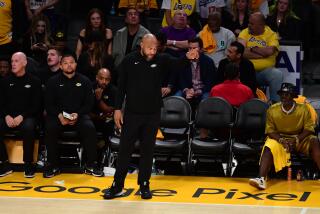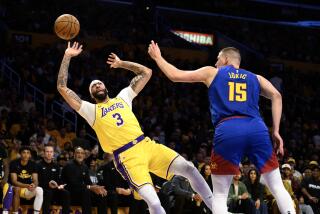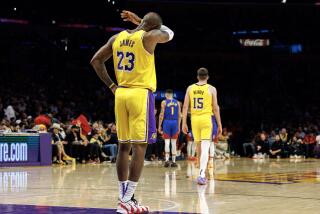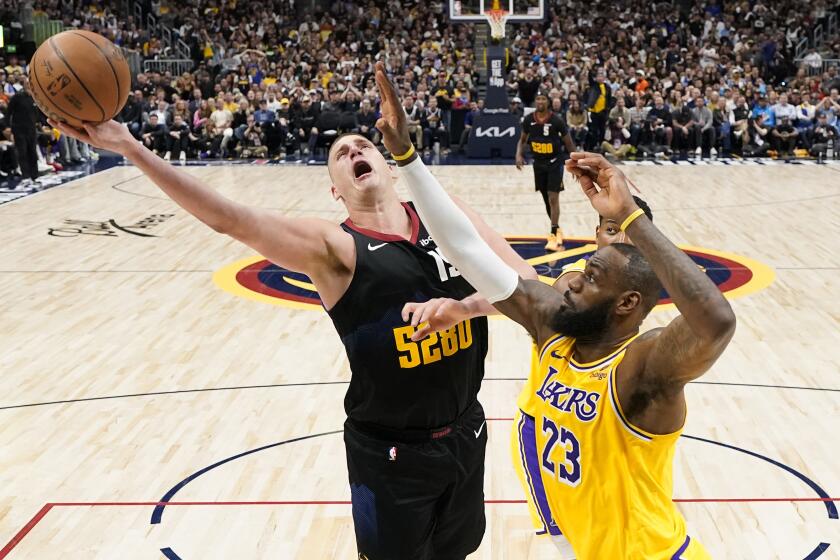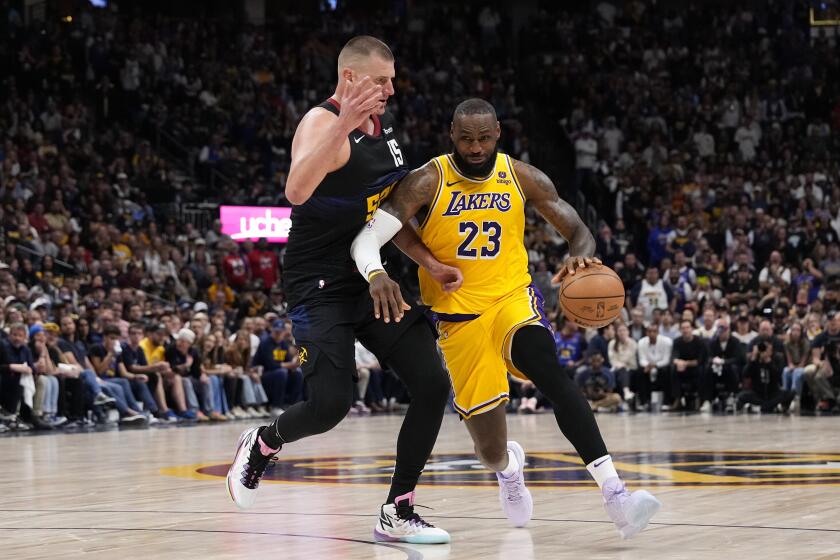There’s a proven fix for NBA’s problem
David Stern is a smart guy. Smart guys know when they have a problem. Even smarter guys know when there is a blueprint to fix it.
Stern, commissioner of the National Basketball Assn., has a problem of public perception -- and that makes it a huge problem, because the public creates the buzz that pays the bills.
Last year, NBA referee Tim Donaghy confessed to gambling on games, including some he worked. Stern characterized Donaghy as one bad apple, not representative of a trend.
Then, during the recent NBA Finals, court documents released in the Donaghy case quoted Donaghy as saying the crew that worked Game 6 of the 2002 playoff series between the Lakers and Sacramento Kings stole the game from the Kings by calling an excessive number of fouls on them.
The indication was that those refs, as part of an NBA that does better in sales, marketing and TV ratings with glamour teams from big cities, wanted to help the Lakers at the expense of the team from Cowtown up the 5 Freeway.
Stern said these were the words of an “admitted felon” and, as such, should be dismissed. NBA fans -- in the midst of a Finals that matched the Lakers and Celtics and featured the usual wide discrepancy of fouls from game to game and the usual whining/posturing/manipulating for the next game by the offended coach -- heard the Donaghy accusations and opened their eyes wide.
That was followed by nods that translated into: “I kind of figured that all along.”
Deep down, fans don’t believe there is a conspiracy to help the big teams. Deep down, the fans think it is subtle, unspoken and not discouraged by those at the top, a.k.a. Stern.
Which brings us to the blueprint of how to fix this. All Stern has to do is walk down the street in Manhattan to the office of the commissioner of Major League Baseball, sit down with Bud Selig and ask, “Now Bud, just how did you get this Mitchell Report thing going?”
It’s that easy. This time last year, Selig ruled a sport that the public thought was full of juicers. There was almost as much buzz about steroids and HGH as there was about home runs and pennant races.
This year, the games go on while assumptions are made that, because of the Mitchell Report and what it brought to light, baseball’s playing field is level again.
Stern has, to this point, opted for internal investigations, his foxes guarding his henhouse. The public isn’t buying it. Nor will the public just forget easily, now that the season is over. This is an Olympic year, and in a month, Kobe and his friends on Dream Team USA will be dominating the sports scene from China.
To date, Stern has come off both defensive and a bit arrogant on this subject.
Sports Illustrated had a phrase for his use of referee Dick Bavetta, one of the crew from the now-questioned Lakers-Kings Game 6, in the Lakers-Celtics Finals. The magazine called it a “metaphorical middle finger.”
Ralph Nader, consumer watchdog, presidential candidate and frequent critic of Stern, calls him “imperious.”
Stern is at the point where he is perceived, probably wrongly, to be part of the problem. That makes it tougher to be part of the solution.
When the snowball starts running down the hill, it grows, as in:
* Donaghy talks about Lakers-Kings Game 6;
* Which begets questions about the Maloof brothers’ owning a Las Vegas casino and the NBA’s Kings;
* Which begets uneasiness about Charles Barkley’s big gambling debt;
* Which begets questions about the unpaid $50,000 bill from All-Star weekend ’07 owed by Alonzo Mourning’s foundation;
* Which begets memories of Michael Jordan’s gambling problems;
* Which begets the story about the NBA ref, showing off to a friend in a bar by calling Jordan on Jordan’s cellphone.
Taken alone, most of that is boys-will-be-boys. Lumped together, it brings furrowed brows and hesitation when the season-ticket mailing arrives.
It’s fixable.
George Mitchell brought credibility and careful due diligence to baseball in its time of need. He named names, did so with well-supported facts, and even gave Selig a tick-box of future-course recommendations that has allowed baseball to get back to business quickly and effectively.
The only person who challenged the report, Roger Clemens, crashed and burned in the public flames of his own arrogance. If Mitchell made mistakes, they haven’t surfaced or weren’t substantive.
His report was independent, it had no agenda other than getting it right, and the public saw and embraced that. It took Mitchell a lot of time and made his law firm a lot of money. Most likely, he and his people would not be up for another run of league-fixing.
But they have left the blueprint and Stern certainly can read one of those.
Like we said, he’s a smart guy.
--
Bill Dwyre can be reached at bill.dwyre@latimes.com. To read previous columns by Dwyre, go to latimes.com/dwyre.
More to Read
All things Lakers, all the time.
Get all the Lakers news you need in Dan Woike's weekly newsletter.
You may occasionally receive promotional content from the Los Angeles Times.
